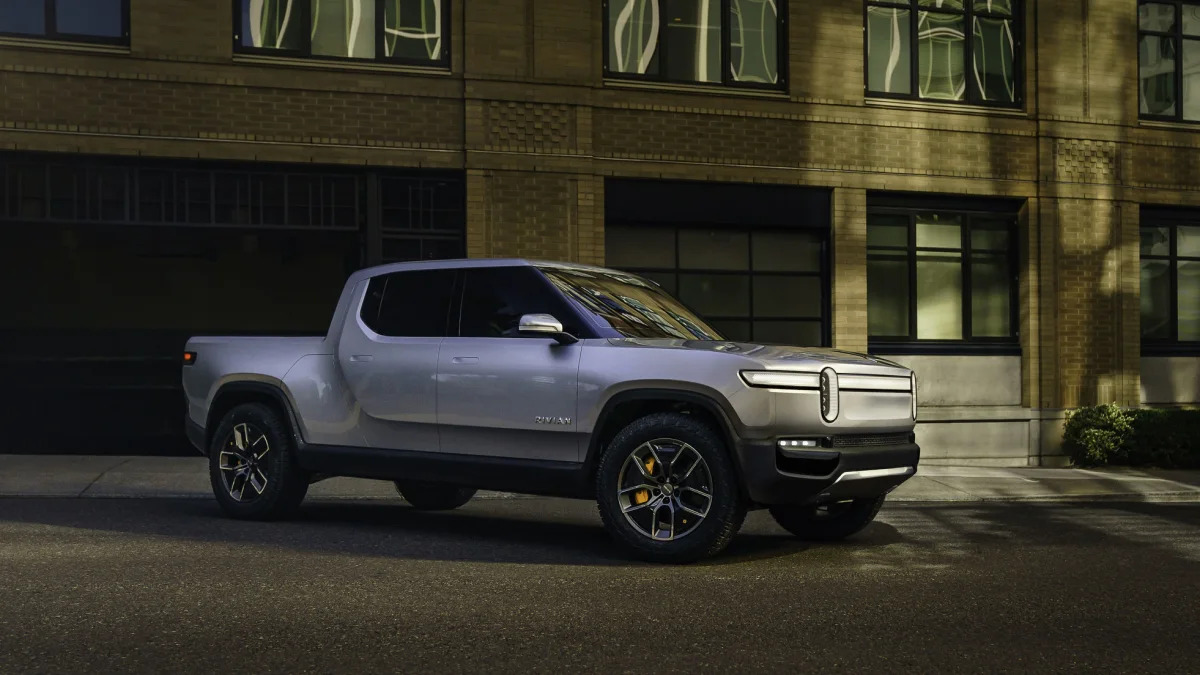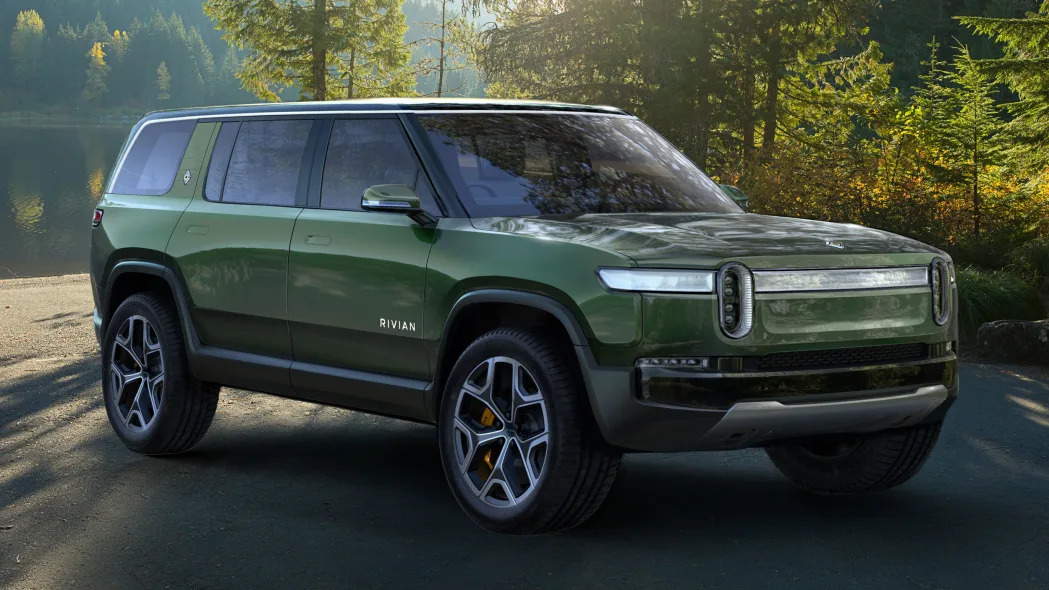Startup Rivian created the biggest buzz of the L.A. Auto Show by coming out of virtual oblivion to deliver not one but two battery-electric off-road vehicles with supercar-worthy acceleration and Tesla-fighting range figures. So who are these guys and how did they stay so undiscovered all this time?
To be sure, it's not like the company, which was founded as Mainstream Motors in Florida in 2009 and quickly changed its name to Avera Automotive before settling on Rivian, flew completely under the radar. But it's one thing to read about claims of 400-mile-plus driving range, 3-second 0-60 times and 11,000-pound towing capacity, and quite another to see what they've actually made — the R1T pickup truck and its companion, the R1S SUV.
The company was the brainchild of then-26-year-old R.J. Scaringe (he's now 35), a nature and car enthusiast who grew up on Florida's Indian River but was frustrated by what he saw as a lack of environmentally sustainable automobiles. Scaringe earned a master's and doctorate in mechanical engineering from MIT, where he worked on the research team at the Sloan Automotive Laboratory.
Rivian moved to the Detroit area from Florida in 2015 and now makes its de facto headquarters, design and engineering center in a former cash-register factory in suburban Plymouth, Mich. "There was literally no sign on the building," says Ken Shuman, chief communications officer.
Rivian now has four other locations: a battery lab in Irvine, Calif.; a connected car and autonomous research and development center in San Jose, Calif.; a small engineering office in the U.K.; and a manufacturing center under development in Normal, Ill., where the company bought a 2.4-million-square-foot former Mitsubishi factory for a reported $16 million, with plans to sink more than $40 million into the plant by 2022. Production is set to begin there next year.
"We've already got a team of around 60 people in that facility," says Mark Vinnels, the company's executive director of engineering and programs. "All the tooling, paint shop, everything. Configuring it for how we're going to build this car. Those guys are intimately involved with the design of all the components, and have been for a couple of years. So the design for manufacturing, the quality aspirations that we've got for the vehicle, that's a key part of that."
To be sure, it's not like the company, which was founded as Mainstream Motors in Florida in 2009 and quickly changed its name to Avera Automotive before settling on Rivian, flew completely under the radar. But it's one thing to read about claims of 400-mile-plus driving range, 3-second 0-60 times and 11,000-pound towing capacity, and quite another to see what they've actually made — the R1T pickup truck and its companion, the R1S SUV.
The company was the brainchild of then-26-year-old R.J. Scaringe (he's now 35), a nature and car enthusiast who grew up on Florida's Indian River but was frustrated by what he saw as a lack of environmentally sustainable automobiles. Scaringe earned a master's and doctorate in mechanical engineering from MIT, where he worked on the research team at the Sloan Automotive Laboratory.
Rivian moved to the Detroit area from Florida in 2015 and now makes its de facto headquarters, design and engineering center in a former cash-register factory in suburban Plymouth, Mich. "There was literally no sign on the building," says Ken Shuman, chief communications officer.
Rivian now has four other locations: a battery lab in Irvine, Calif.; a connected car and autonomous research and development center in San Jose, Calif.; a small engineering office in the U.K.; and a manufacturing center under development in Normal, Ill., where the company bought a 2.4-million-square-foot former Mitsubishi factory for a reported $16 million, with plans to sink more than $40 million into the plant by 2022. Production is set to begin there next year.
"We've already got a team of around 60 people in that facility," says Mark Vinnels, the company's executive director of engineering and programs. "All the tooling, paint shop, everything. Configuring it for how we're going to build this car. Those guys are intimately involved with the design of all the components, and have been for a couple of years. So the design for manufacturing, the quality aspirations that we've got for the vehicle, that's a key part of that."
Just where the company is getting all the money necessary to achieve its dreams remains a closely held secret. In May, the Chicago Tribune reported that Rivian had secured a $200 million loan to begin production and had raised $450 million to date. It said investors included Sumitomo Corporation of America and the investment arm of Saudi company Abdul Latif Jameel. It has also received state and local tax incentives in Illinois.
"We've got a really strong source of money, financing for the company is solid ... good investors who understand motorcars and are in it for the long game, and don't want to make a quick return and understand that putting cars into production is super difficult and costs a lot of money," said Vinnels, who joined Rivian 13 months ago after a long stint with McLaren and, before that, Lotus Group.
"That's gotta be the foundation of building a solid car company. What you're seeing here is the result of a lot of work that's already gone on, on a very sound basis, for what we believe will be a groundbreaking, reliable, safe product when it comes to production. And that's why we're not racing to production now. There's still a lot that we need to do. What you see here reflects production intent ... but we recognize that we've got to make sure the car's reliable, the quality's there."
Vinnels talks a lot about the on- and off-road capabilities of both models, calling Rivian an "adventure brand." Its off-road specs are bolstered by quad all-wheel drive independent electric motors, each nearly 200 horsepower, capable of delivering independent, instantaneous torque to each wheel. There's also unequal-length double-wishbone suspension in front and multi-link suspension in the rear, with dynamic roll control, adaptive dampers and adjustable air suspension, so you can stiffen the ride for extra agility and handling on pavement.
He also dished on the evolution of that unique headlight design, which he said the company "spent a ton of time thinking about."
"We wanted a face," he said. "We're a new brand. Nobody knows who Rivian is. What we want is something that people recognize. Maybe when you leave today, you should pretty much be able to sketch it based on the simplicity and elegance of it. I have to say it's not something we fell upon easily. We had a lot of hard work, a lot of different designs, even when we were a full-size model of this, we hadn't focused on that design. In fact it was one of the designers who was working on advanced vehicles, a vehicle we were looking at for 2025, 2026, who sketched this, and we loved it. And we said let's try it on this model."
Each model will debut with Level 3 autonomous driving capabilities. Similar to Tesla, they'll get over-the-air software updates. They'll also have the ability to operate three apps simultaneously, and three screens, including one in the backseat for climate and infotainment.
Order books are now open for a fall 2020 delivery on the R1T pickup and 2021 for the R1S. The former starts at $69,000, or $61,500 after federal EV tax credits, while the latter starts at $72,500 ($65,000), Shuman said.
Related Video:
"We've got a really strong source of money, financing for the company is solid ... good investors who understand motorcars and are in it for the long game, and don't want to make a quick return and understand that putting cars into production is super difficult and costs a lot of money," said Vinnels, who joined Rivian 13 months ago after a long stint with McLaren and, before that, Lotus Group.
"That's gotta be the foundation of building a solid car company. What you're seeing here is the result of a lot of work that's already gone on, on a very sound basis, for what we believe will be a groundbreaking, reliable, safe product when it comes to production. And that's why we're not racing to production now. There's still a lot that we need to do. What you see here reflects production intent ... but we recognize that we've got to make sure the car's reliable, the quality's there."
Vinnels talks a lot about the on- and off-road capabilities of both models, calling Rivian an "adventure brand." Its off-road specs are bolstered by quad all-wheel drive independent electric motors, each nearly 200 horsepower, capable of delivering independent, instantaneous torque to each wheel. There's also unequal-length double-wishbone suspension in front and multi-link suspension in the rear, with dynamic roll control, adaptive dampers and adjustable air suspension, so you can stiffen the ride for extra agility and handling on pavement.
He also dished on the evolution of that unique headlight design, which he said the company "spent a ton of time thinking about."
"We wanted a face," he said. "We're a new brand. Nobody knows who Rivian is. What we want is something that people recognize. Maybe when you leave today, you should pretty much be able to sketch it based on the simplicity and elegance of it. I have to say it's not something we fell upon easily. We had a lot of hard work, a lot of different designs, even when we were a full-size model of this, we hadn't focused on that design. In fact it was one of the designers who was working on advanced vehicles, a vehicle we were looking at for 2025, 2026, who sketched this, and we loved it. And we said let's try it on this model."
Each model will debut with Level 3 autonomous driving capabilities. Similar to Tesla, they'll get over-the-air software updates. They'll also have the ability to operate three apps simultaneously, and three screens, including one in the backseat for climate and infotainment.
Order books are now open for a fall 2020 delivery on the R1T pickup and 2021 for the R1S. The former starts at $69,000, or $61,500 after federal EV tax credits, while the latter starts at $72,500 ($65,000), Shuman said.
Related Video:











Sign in to post
Please sign in to leave a comment.
Continue